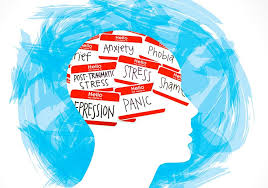Mental Health: many teens suffer with significant stress levels that rival that of adults

A 2013 survey by APA found that stress was extremely common among teenagers: 83% of the teens surveyed said school was a significant or somewhat significant source of stress. But academics aren’t the only thing worrying today’s youth. A 2018 APA survey found that young people ages 15 to 21 — Generation Z — report significant stress around social issues in the news, including gun violence and school shootings, rising suicide rates, climate change, treatment of immigrants and sexual harassment. Peers can help buffer stress, but can also be a source of it. Social relationships are especially important in adolescence. Many teens worry about fitting in, their first romantic relationships and peer pressure around substance use and sex.
*This is part two of a three-part series on mental health among teens.
As students juggle school, extracurriculars, work and family responsibilities the amount of stress they are under grows. More students are complaining about mental health issues than ever before.
“I try to not overload myself with stuff in school and outside of school because that’s when it causes conflicts,” Wesley Allen, sophomore, said. “Because things in school do not go hand-in-hand with things outside of school.”
Everyday, students wake up, go to school and work for seven and a half hours, some then go directly to extracurriculars and don’t get home until after 7 o’clock while others go to jobs or go home to help with their siblings. And they do it five days a week. It’s hard to maintain all of the responsibilities students have, and excel in them, while still having time to do the things they want to do.
“I really see it with the kids I work with because they’re doing all the advanced stuff,” Christine Fougerrouse, advanced academic coordinator, said. “The pressure to do everything as perfectly as you possibly can to get into the best college you can possibly get into.”
Something a lot of people blow off or do not care to think about is how times have changed and how society has changed our schools. With the advancement of technology and an increase in rigor, high school has become increasingly more competitive.
“I can’t imagine what you all have to deal with as far as feeling you not only have to be perfect academically but you’ve got to look great on Instagram and you’ve got to make it seem like everything’s great,” Fougerrouse said. “And that’s not real, it’s not healthy, but that’s what you live in and man, that is a scary challenge to me.”
On the other hand though, some students and teachers have different perspectives on the topic.
“I don’t think there’s more work or more going on in our lives,” Kristi Carden, English teacher, said. “I feel like this generation feels stress and talks about stress more, and lets it become a part of their lives.”
At this point, we know that teens are stressed out and mental health is a struggle, but do we consider it a crisis?
“People say all the time that we have to teach students how to be adults in the world, but one of the things that even adults need to learn is how to deal with their own mental health,” Carden said. “And how to handle it proactively and make sure that they are okay as people.”
Fougerousse had a slightly different opinion, though.
“Crisis is a word that I think it’s overused,” she said. “And I also think crisis connotes like a moment where it’s really difficult and then it gets better. Like a hurricane hits your town, that’s a crisis. I think this just is what life is now. And do I think it’s something we really need to pay attention to as adults? Yeah. We’re not doing enough. As a society, we’re just not doing enough.”
As everyone agrees that mental health is a problem that needs to be dealt with, the next step is figuring out how to go about it and actually make a change.
“I mean, obviously, the best thing would be for there to be a mental health class,” Carden said. “Like a class where kids have time to reflect on themselves; that’s the only way schools can do something. It would have to be started at the state level.”
But while adults think more about society and what can be done on a district or state level, students take more of the personal-relationship/one-on-one route.
“I feel like teachers need to become more accessible,” Allen said. “Not necessarily on their own time, but just be more considerate of what the students do outside of their class. And understand if there are students that have, like, family issues or something like that, let their counselors know so that their counselor can help.”
As for that, teachers are trying.
“I guess the first thing we have to do is try to create a relationship with each other,” Carden said. “So that I know when it gets worse than normal. With that in mind it’s like trying to take the time to recognize when that’s happening and then trying to talk them through that as much as I can and teach them the strategies that they need to overcome it.”
Fougerousee, though, tries to take Carden’s idea one step further.
“I’ll actually go into classes and we’ll talk about stress management techniques: breathing, meditation, doing things like that,” she said. “And that’s for those times when you’ve done everything right, you know, you have your calendar and you organize your time but then you’re just overwhelmed and freaked out and that happens. So it’s a good technique.”
In addition to the teachers, the school counselors are well versed in stress management and are available to talk.
